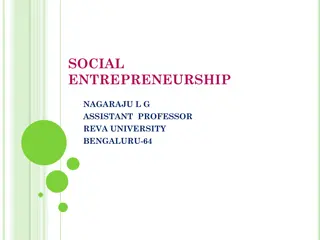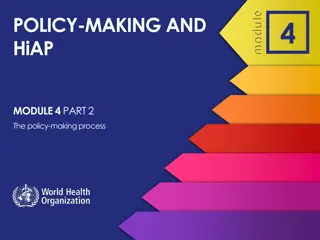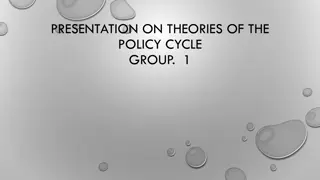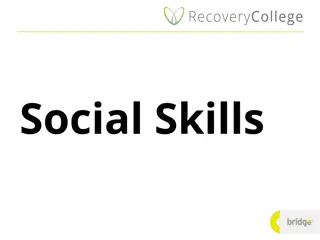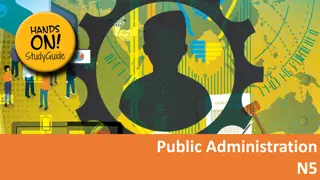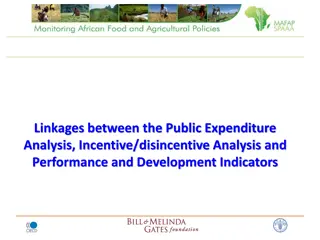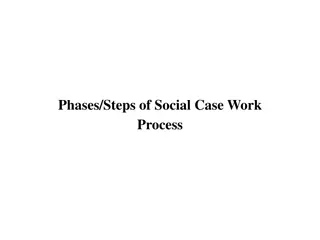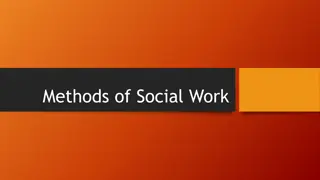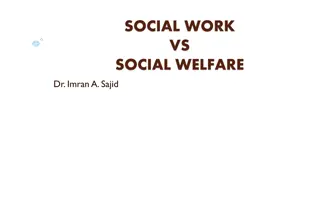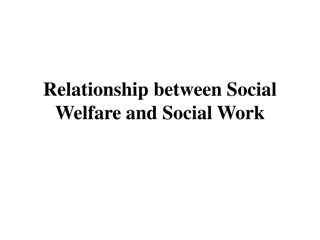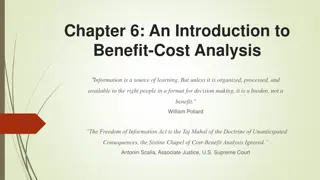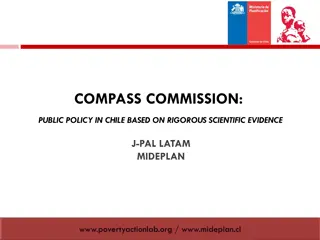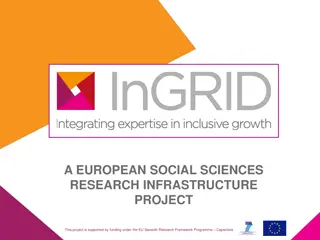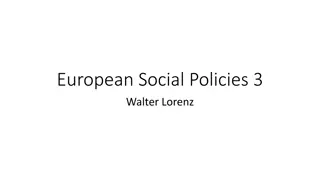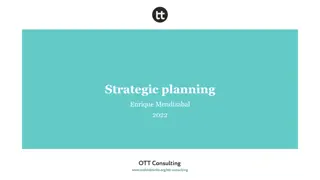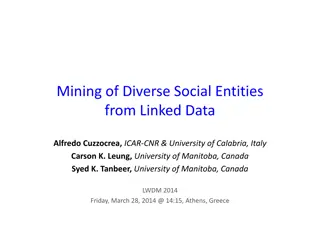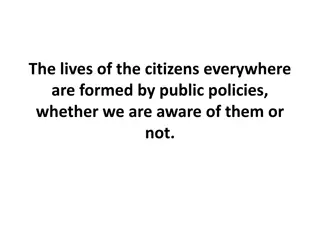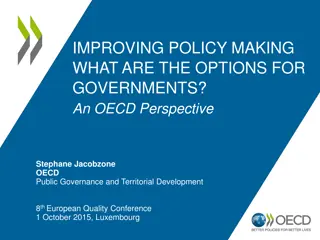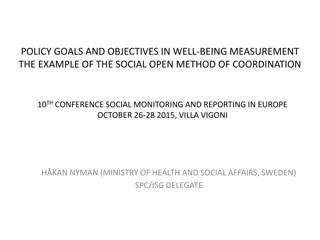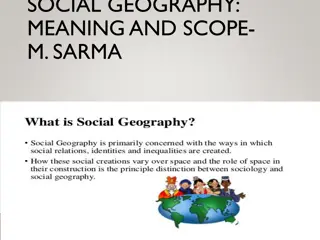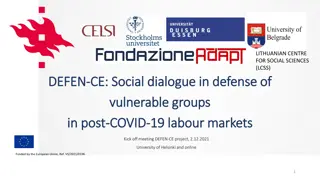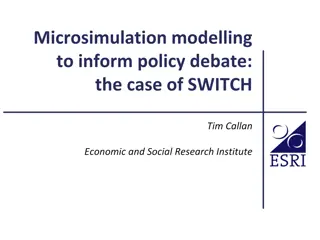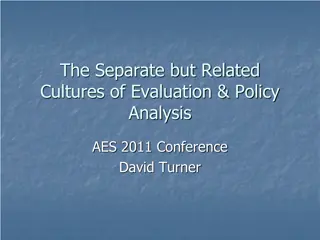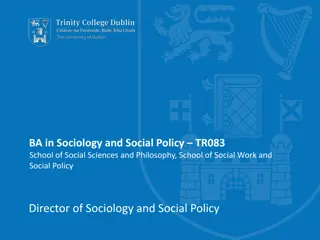Gender Equity and Social Inclusion Policy Overview
This overview highlights the Gender Equity and Social Inclusion (GESI) Policy promoted by the Department of Personnel Management in Papua New Guinea. The policy aims to ensure fair participation of disadvantaged individuals in employment and opportunities, along with social inclusion to realize the
1 views • 18 slides
Understanding Social Entrepreneurship, Social Enterprise, and Social Innovation
Social entrepreneurship involves creating sustainable social impact, social enterprises address challenges in critical needs sectors, and social innovation focuses on developing effective solutions to social and environmental issues. These concepts emphasize creating social value while engaging with
2 views • 19 slides
Understanding Policy Analysis Process in Health Administration
Policy analysis involves providing informed advice to clients on public policy decisions, including recommended courses of action based on identified issues and problem statements. This process entails defining the problem, exploring options, and making recommendations to address public policy chall
1 views • 26 slides
Understanding Policy-Making Process for Health Improvement
Policy-making involves defining policy, recognizing its complex nature, identifying windows of opportunity, and framing health issues. The policy-making cycle includes stages like agenda setting, formulation, and implementation. Alignment of problems, policies, and politics is crucial for effective
1 views • 12 slides
Effective Writing and Policy Briefs: Enhancing Impact in Policy-making
A policy brief is a compelling document designed to influence decision-makers by outlining policy alternatives and courses of action. Discover the value of policy briefs, effective characteristics, and strategies for agenda setting and policy formulation in this comprehensive module.
1 views • 22 slides
Understanding Theories of the Policy Cycle in Policy Analysis
The policy cycle theory describes the evolution of policy issues from inception to evaluation, impacting scientific research and policy formulation. It outlines stages from the 1950s, influenced by Lasswell's seven-stage model, serving as a framework for organizing policy processes. Despite the line
3 views • 30 slides
Evolution of Social Welfare Policy in Pakistan (1955) and its Impact
The social welfare policy in Pakistan originated in 1955 to address challenges like poverty, lack of education, health issues, inadequate housing, and social maladjustment. Starting with the influx of migrants post-independence in 1947, the policy aimed to establish social services and a welfare sta
4 views • 15 slides
Understanding the Importance of Social Skills for Mental Health Recovery
Social skills play a crucial role in how we communicate, interact, and form relationships with others. They are essential for personal, social, and professional success. Neglecting social skills can hinder mental health recovery, as they contribute to social recognition, acceptance, and building soc
2 views • 12 slides
Understanding Medical Social Work and Its Impact on Patient Well-being
Medical Social Work, also known as Health Care Social Work, plays a crucial role in addressing the social, physical, and psychological needs of patients. Through providing case work, after-care, and convalescence services, Medical Social Workers contribute to reducing hospital readmissions, preventi
0 views • 12 slides
Understanding Public Policy-Making Process in Government
Explore the intricacies of public policy-making in government administration, focusing on the importance of providing equal access to basic services for all citizens. Delve into the nature of public policy, factors influencing policy-making, and the procedural aspects involved, including planning, o
0 views • 36 slides
Objectives and Importance of Social Legislation for Social Workers
Social legislation is inspired by the constitution and aims to remove discrimination, safeguard rights of vulnerable groups, and eradicate social evils. It plays a crucial role in social welfare by providing a legal basis for addressing societal issues, enhancing community well-being, and facilitati
0 views • 4 slides
Understanding Linkages Between Public Expenditure Analysis and Incentive/Disincentive Analysis in Policy Development
This article explores the interconnections between public expenditure analysis, incentive/disincentive analysis, and performance and development indicators in the context of agricultural price policies. It examines how policy environments impact commodity markets and different stakeholder groups, su
3 views • 22 slides
Phases and Steps of Social Case Work Process
Social case work process involves three main phases: Social Study, Social Diagnosis, and Social Treatment. The Social Study phase focuses on acquiring facts about the client's situation, while Social Diagnosis involves the professional opinion of the case worker towards a solution. Social Treatment
0 views • 7 slides
Understanding Methods of Social Work
Methods of social work encompass various approaches aimed at enhancing social functioning and addressing problems in individuals and communities. These methods are categorized into primary and secondary methods, each serving different purposes in the field. Primary methods involve direct interaction
0 views • 20 slides
Understanding the Difference Between Social Work and Social Welfare
Social work and social welfare are often used interchangeably, but there are distinct differences between the two. Social work involves highly trained professionals providing services to individuals and communities in need, using problem-solving methods. On the other hand, social welfare focuses on
0 views • 9 slides
Understanding the Relationship Between Social Welfare and Social Work
Social welfare and social work are interconnected concepts aimed at enhancing societal well-being. Social welfare refers to a nation's system of programs and services meeting essential needs, while social work involves professional activities supporting individuals and communities in achieving socia
0 views • 6 slides
Advancement of Social Work in Post-Soviet Countries Conference
The 4th Conference on Advancement of Social Work in Post-Soviet Countries discussed future strategies for social work education, emphasizing the importance of developing knowledge domains, educating social workers, providing services, research, and policy-making. It highlighted the interdisciplinary
0 views • 19 slides
Challenges in Policy Implementation and Lessons Learned
The content discusses the challenges faced in policy implementation, focusing on the gap between policy design and execution. It highlights key steps in policy-making, reasons for implementation failures, and factors influencing successful policy outcomes. Examples from Zambia's National Science and
0 views • 14 slides
Social Economy and Innovation in Emilia-Romagna Region
Emilia-Romagna Region in Italy highlights the importance of social economy and innovation for sustainable development. Various initiatives such as Social Cooperatives and Voluntary Associations contribute to the region's social well-being. The focus on social values and not-for-profit activities dri
1 views • 15 slides
Understanding Social Skills Development in Students
Explore the reasons behind students lacking social skills in school settings and analyze the challenges some face even after receiving social skills instruction. Discover the key social skills required for appropriate interactions and the importance of social competence for overall well-being. Delve
0 views • 64 slides
Overview of Benefit-Cost Analysis in Policy Decision Making
This chapter delves into benefit-cost analysis as an essential tool in policy evaluation. It outlines the steps involved in conducting a benefit-cost analysis, emphasizes the significance of defining and quantifying policy problems, and highlights the importance of identifying the seriousness of soc
0 views • 40 slides
Compass Commission: Public Policy in Chile Based on Rigorous Scientific Evidence
The Compass Commission, initiated by the Ministry of Planning of Chile in collaboration with J-PAL, aimed to identify social policy challenges in Chile and propose innovative public policies for evaluation through randomized control trials. The initiative involved academic members, international and
0 views • 10 slides
European Social Sciences Research Infrastructure Projects
European Social Sciences Research Infrastructure Projects aim to integrate European expertise on inclusive growth through data-driven policy making. Funded under EU programmes, these projects focus on social inclusion, vulnerability, and policy analysis using various data sources. InGRID-2, one such
0 views • 6 slides
European Social Policies and EU Limits: A Comprehensive Overview
EU social policies are guided by the principle of subsidiarity, ensuring decisions are made close to the citizens. The EU's role is to set framework conditions and compensatory programs, while social policy largely remains the responsibility of individual member states. The Union can act in a policy
0 views • 16 slides
Understanding Social Neuroscience: Exploring Human Sociality and Well-Being
Social neuroscience delves into how the brain processes social interactions and their impact on human well-being. It focuses on the interconnectedness between social connections and overall life satisfaction, suggesting that humans are inherently social beings with a strong need for social belonging
2 views • 21 slides
Social Entrepreneurship and Social Inclusion in Bulgaria
The development and implementation of social entrepreneurship practices in Bulgaria aim to promote social inclusion through the development of the social economy. The focus is on combining economic results with social objectives, managed transparently with measurable, positive financial value. Vario
2 views • 12 slides
Theories and Strategies for Effective Policy Change
Explore the intricacies of strategic planning, outcome mapping, change theories, policy windows, and more in the realm of policy entrepreneurship and advocacy. Learn about key concepts such as large leaps theory, policy streams theory, and how think tanks can influence policy decision-making process
0 views • 43 slides
Diverse Social Entities Mining from Linked Data in Social Networks
This research focuses on mining diverse social entities from linked data in social networks using a DF-tree structure and DF-growth mining algorithm. The study explores the extraction of important linked data in social networks and the mining of various social entities such as friends. Prominence va
0 views • 13 slides
Morality in UK Drug Policy: Policy Constellations Analysis
Morality plays a significant role in shaping drug policy in the UK, as revealed by the research conducted by Professor Alex Stevens at the University of Kent. The study investigates the moral commitments underlying different policy positions in UK drug policy debates, highlighting five ethico-politi
0 views • 19 slides
Evolution of Public Policy: From Seeds Sown in 1940s to Academic Discipline in Social Science
The lives of citizens are shaped by public policies, often unnoticed. The analysis of current public policy in America carries a unique 20th-century essence. Beginning in the 1940s, these policy seeds have profoundly influenced government and academic institutions. By the early 1950s, public policy
0 views • 6 slides
Industrial Policy: The Old and The New - Insights by Dani Rodrik
Industrial policy, as presented by Dani Rodrik in May 2019, emphasizes the importance of empirical work, the differences between old and new policies, and the targets industrial policy should focus on. The theoretical arguments for industrial policy highlight market imperfections, learning spillover
0 views • 26 slides
Enhancing Policy Making: Options for Governments - An OECD Perspective
Various tools and approaches are discussed to improve policy making, including foresight, cost-benefit analysis, and regulatory tools. The changing context of policy challenges is highlighted, along with the OECD policy toolkit's modular approach. Strategies like talking to leaders, engaging stakeho
0 views • 20 slides
Policy Goals and Objectives in the Social Open Method of Coordination
The Social Open Method of Coordination (OMC) is a voluntary political cooperation process that focuses on agreeing on policy goals, common objectives, and measuring progress with common indicators. It involves stakeholder collaboration, integration of economic and social policies, and promoting soci
0 views • 16 slides
Understanding Social Geography: Meaning, Scope, and Differences
Social geography is a branch of human geography focusing on social structures, groups, and activities. It examines the spatial arrangement of social phenomena, social differences, and patterns in understanding socially defined population groups. The scope of social geography includes analyzing spati
0 views • 25 slides
Techniques of Writing Policy Analysis by Adeyemi Fajingbesi
Adeyemi Fajingbesi presents a comprehensive guide on policy analysis highlighting the nature of public problems, the importance of policy recommendations, and a step-by-step approach to conducting sound policy analysis. Learn about defining problems, setting goals, selecting and implementing policie
0 views • 13 slides
Understanding Policy Formulation: Key Concepts and Approaches
Policy formulation is a crucial step in the policy-making process, involving identifying and crafting policy alternatives to address various issues. This phase requires participants to define policy problems, develop alternatives, and select the most feasible solutions based on criteria such as feas
0 views • 12 slides
Social Dialogue in Defense of Vulnerable Groups in Post-COVID-19 Labour Markets
The Lithuanian Centre for Social Sciences (LCSS) is hosting the DEFEN-CE project kickoff meeting at the University of Helsinki, focusing on social dialogue in defense of vulnerable groups in post-COVID-19 labor markets. The project aims to explore the role of social dialogue in addressing employment
0 views • 33 slides
Microsimulation Modelling to Inform Policy Debate: The Case of SWITCH
This presentation discusses the usage of the SWITCH microsimulation model to inform policy debates by simulating the impact of tax and welfare policy reforms on household incomes and work incentives. It covers the areas investigated using SWITCH, selected users of SWITCH research, and the role of SW
0 views • 21 slides
Cultures of Evaluation and Policy Analysis: Uncovering Common Ground and Divergent Paths
This paper explores the separate yet interconnected cultures of evaluation and policy analysis, revealing how practitioners in these fields share common objectives while drawing upon distinct literatures and methodologies. The analysis uncovers discrepancies in the sources cited and publication focu
0 views • 25 slides
Explore Bachelor of Sociology and Social Policy at Trinity College Dublin
Discover the unique Bachelor of Sociology and Social Policy program at Trinity College Dublin, delving into social theory, social policy, and social research. Uncover topics like poverty, inequality, homelessness, and more, with modules focusing on social policies and sociology theories that shape s
0 views • 18 slides

